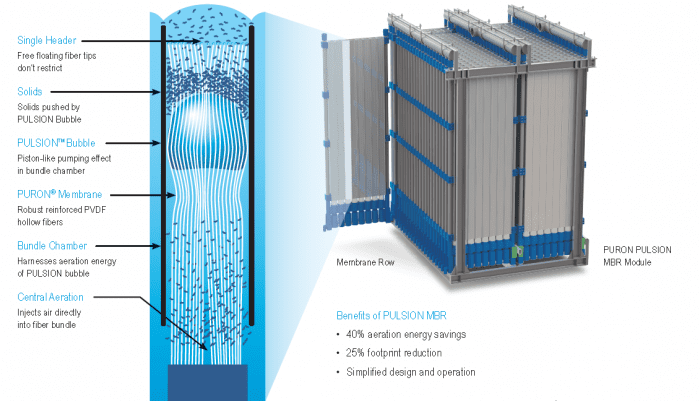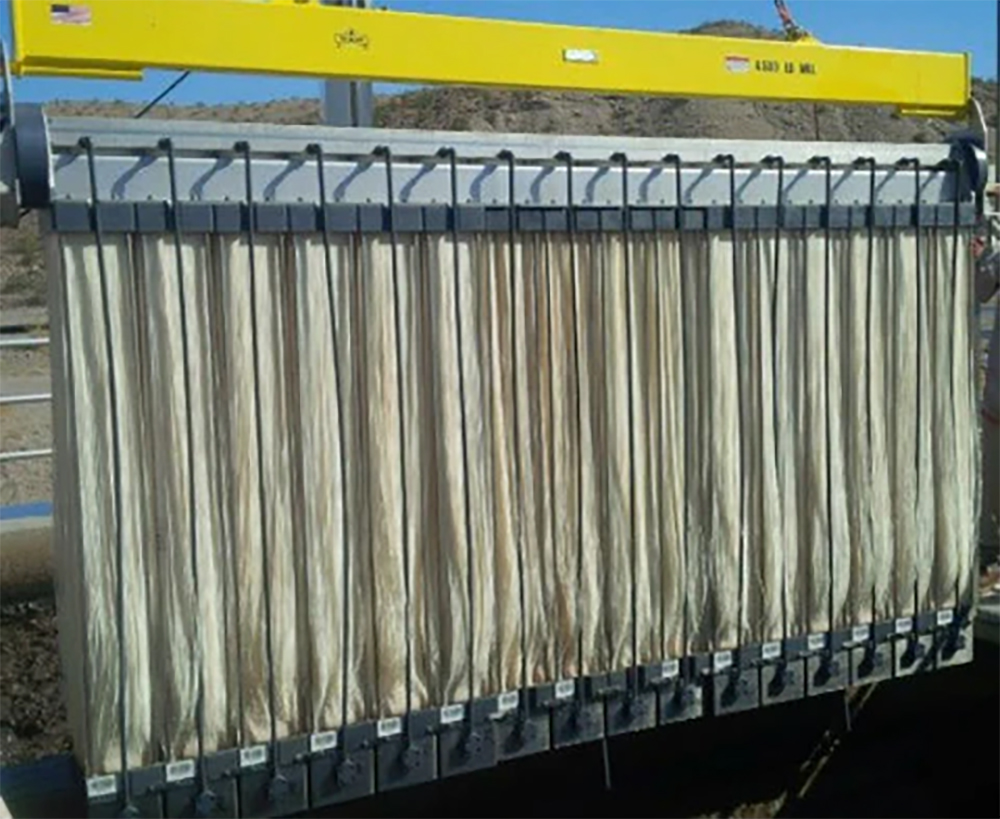Exploring the Environmental Impact of Membrane Bioreactor in Wastewater Treatment
Exploring the Environmental Impact of Membrane Bioreactor in Wastewater Treatment
Blog Article
Exactly How Membrane Bioreactors Are Revolutionizing Water Filtration Systems
The emergence of membrane bioreactors (MBRs) represents a substantial innovation in the field of water purification, merging biological therapy procedures with cutting-edge membrane filtration technologies. As global water scarcity increases, the duty of MBRs in promoting safe and clean water reuse and lasting water monitoring ends up being increasingly vital.
Introduction of Membrane Bioreactors
Membrane bioreactors (MBRs) represent a significant development in water purification technology, as they combine biological therapy procedures with membrane layer filtering. This combination improves the efficiency of wastewater therapy by making use of microbes to break down natural contaminants while concurrently utilizing semi-permeable membranes to different cured water from suspended solids and microorganisms.
The MBR system typically contains an organic reactor where the microbial population metabolizes impurities, adhered to by a membrane filtration device that maintains biomass and enables only tidy water to travel through. This twin functionality results in greater effluent top quality compared to standard treatment approaches. MBRs can be run in both batch and continual flow modes, using flexibility in layout and application.
Furthermore, MBRs are defined by their compact impact, making them suitable for city setups with room constraints. Membrane Bioreactor. They also allow the recovery of water for reuse, therefore contributing to water sustainability efforts. While MBR technology has actually obtained popularity in local and industrial applications, its operational intricacies and power demands require mindful consideration throughout execution. Generally, MBRs go to the forefront of enhancing water therapy efficiency and top quality, showcasing the capacity for cutting-edge solutions in environmental monitoring.
Benefits of MBR Modern Technology
The assimilation of biological treatment with membrane filtering supplies numerous advantages for water purification processes. One of the main advantages of Membrane layer Bioreactor (MBR) technology is its ability to successfully get rid of both not natural and natural impurities, bring about top quality effluent. The membranes serve as a physical barrier, preventing suspended solids and pathogens from passing through, which enhances the overall safety and reliability of treated water.
Furthermore, MBR systems require a smaller footprint contrasted to standard therapy approaches, permitting extra reliable area usage. This small design is particularly advantageous in urban setups where land is restricted. MBRs likewise demonstrate operational adaptability, accommodating differing influent qualities and circulation rates without considerable performance destruction.
In addition, the procedure provides enhanced nutrient elimination capacities, especially for nitrogen and phosphorus, which are vital for avoiding eutrophication in obtaining waters. The minimized sludge production related to MBR modern technology additionally equates to decrease disposal expenses, making it an economical service in the lengthy run - Membrane Bioreactor. Generally, the advantages of MBR modern technology setting it as a leading choice for sustainable and cutting-edge water filtration systems, resolving both environmental and economic issues
Applications in Water Purification
Applications of Membrane Layer Bioreactor (MBR) technology in water purification are varied and impactful, addressing various therapy requires across numerous markets. MBRs successfully combine organic treatment processes with membrane layer filtering, making them ideal for local wastewater therapy, industrial effluent monitoring, and even potable water reuse efforts.
In community setups, MBRs are significantly utilized to boost the quality of treated wastewater, enabling for conformity with rigorous discharge regulations and assisting in the recycling of water for irrigation and non-potable usages. Their small layout also makes them ideal for urban try this atmospheres where room is restricted.
Industrially, MBR modern technology is utilized to treat process water and wastewater, especially in markets such as food and drink, drugs, and fabrics. By properly getting rid of impurities and suspended solids, MBRs help industries minimize environmental impacts while recovering valuable sources from wastewater streams.
Additionally, MBRs are getting grip in decentralized water treatment applications, where small-scale systems can be deployed in remote areas or establishing regions. This versatility enables communities to attain lasting water administration remedies, boosting accessibility to clean water while decreasing dependence on typical therapy techniques.
Situation Studies and Success Stories

In an additional example, a fabric production facility in Bangladesh took on MBR modern technology to resolve its wastewater challenges. The system lowered chemical check my site oxygen need (COD) levels from 1,200 mg/L to much less than 100 mg/L, thus fulfilling regulative requirements and significantly decreasing environmental influence.
The University of Cape Community's MBR setup has actually confirmed efficient in dealing with greywater for non-potable reuse on school. This task not only preserves drinkable water however additionally serves as an instructional design for lasting practices.
Moreover, a seafood handling plant in Norway utilized MBR modern technology to treat effluents having high degrees of organic issue, achieving over 90% contaminant removal. These situation researches underscore MBR modern technology's versatility and its essential role in improving water quality across varied applications.
Future of Water Therapy Solutions
As global water shortage and air pollution challenges heighten, ingenious water treatment options are becoming progressively vital to ensure lasting accessibility to tidy water. The future of water treatment exists in the integration of sophisticated modern technologies that enhance the efficiency and efficiency of filtration procedures. Membrane layer bioreactors (MBRs) are at the center of this advancement, combining biological treatment with membrane filtration to produce high-grade effluent suitable for various applications.

Arising fads such as source recuperation from wastewater, consisting of nutrients and power, will certainly additionally change treatment facilities into eco-friendly hubs. Additionally, innovations in nanotechnology and membrane layer products guarantee enhanced performance and longevity of purification systems.

Final Thought
Finally, website link membrane layer bioreactors stand for a significant advancement in water filtration technologies, properly integrating biological therapy with sophisticated membrane purification. The various benefits, including boosted effluent high quality and reduced spatial needs, make MBRs particularly appropriate for metropolitan applications. Their function in potable water reuse and lasting water management highlights their value in addressing international water scarcity challenges. Proceeded r & d will additionally boost the efficacy and fostering of MBR technology, making sure a durable future for water therapy solutions.
The introduction of membrane layer bioreactors (MBRs) stands for a significant development in the area of water filtration, combining organic treatment procedures with sophisticated membrane filtration innovations. As worldwide water shortage magnifies, the role of MBRs in assisting in drinkable water reuse and lasting water management becomes increasingly vital. They likewise make it possible for the recuperation of water for reuse, hence adding to water sustainability campaigns.As international water scarcity and pollution challenges magnify, ingenious water treatment services are becoming increasingly important to guarantee sustainable access to clean water. Their role in safe and clean water reuse and lasting water monitoring highlights their value in attending to worldwide water shortage challenges.
Report this page